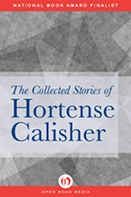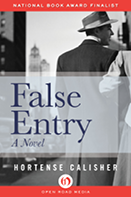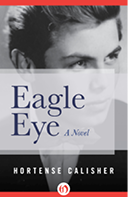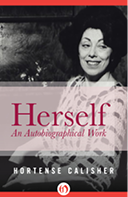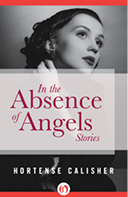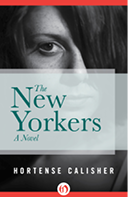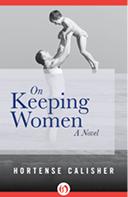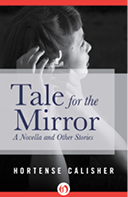In the Absence of Angels (26 page)
Read In the Absence of Angels Online
Authors: Hortense Calisher

“Why …it’s a beautiful job, Mother,” she said, distilling the carefully natural tone of her voice. “Neat as can be. I had no idea …I thought it would be ugly.” With a step toward her mother, she looked, as if casually, at the dreadful neatness of the cicatrix, at the twisted, foreshortened tendon of the upper arm.
“I can’t raise my arm yet,” whispered her mother. “They had to cut deep. …Your father won’t look at it.”
In an eternity of slowness, Hester stretched out her hand. Trembling, she touched a tentative finger to her mother’s chest, where the breast had been. Then, with rising sureness, with infinite delicacy, she drew her fingertips along the length of the scar in a light, affirmative caress, and they stood eye to eye for an immeasurable second, on equal ground at last.
In the cold, darkening room, Hester unclenched herself from remembrance. She was always vulnerable, Hester thought. As we all are. What she bequeathed me unwittingly, ironically, was fortitude — the fortitude of those who have had to live under the blow. But pity — that I found for myself.
She knew now that the tangents of her mother and herself would never have fully met, even if her mother had lived. Holding her mother’s hand through the long night as she retreated over the border line of narcosis and coma into death, she had felt the giddy sense of conquering, the heady euphoria of being still alive, which comes to the watcher in the night. Nevertheless, she had known with sureness, even then, that she would go on all her life trying to “show” her mother, in an unsatisfied effort to earn her approval — and unconditional love.
As a child, she had slapped at her mother once in a frenzy of rebellion, and her mother, in reproof, had told her the tale of the peasant girl who had struck her mother and had later fallen ill and died and been buried in the village cemetery. When the mourners came to tend the mound, they found that the corpse’s offending hand had grown out of the grave. They cut it off and reburied it, but when they came again in the morning, the hand had grown again. So, too, thought Hester, even though I might learn — have learned in some ways — to escape my mother’s hand, all my life I will have to push it down; all my life my mother’s hand will grow again out of the unquiet grave of the past.
It was her own life that was in the middle drawer. She was the person she was not only because of her mother but because, fifty-eight years before, in the little town of Oberelsbach, another woman, whose qualities she would never know, had died too soon. Death, she thought, absolves equally the bungler, the evildoer, the unloving, and the unloved— but never the living. In the end, the cicatrix that she had, in the smallest of ways, helped her mother to bear had eaten its way in and killed. The living carry, she thought, perhaps not one tangible wound but the burden of the innumerable small cicatrices imposed on us by our beginnings; we carry them with us always, and from these, from this agony, we are not absolved.
She turned the key and opened the drawer.
O
F THE STORIES IN
the book the following appeared originally in
The New Yorker
: “The Middle Drawer,” “The Pool of Narcissus,” “A Box of Ginger,” “The Watchers,” “In Greenwich There Are Many Graveled Walks,” “Old Stock” and “In the Absence of Angels” (in a slightly different form). The author is grateful to
The New Yorker
for permission to reprint.
The author also wishes to thank the
New American Mercury
for permission to reprint “Heartburn”;
Harpers Magazine
for “One of the Chosen” and for “Night Riders of Northville”;
Harper’s Bazaar
for “Point of Departure”;
Mademoiselle
for “A Wreath for Miss Totten” and “The Woman Who Was Everybody.”
Hortense Calisher (1911–2009) was born in New York City. The daughter of a young German-Jewish immigrant mother and a somewhat older Jewish father from Virginia, she graduated from Barnard College in 1932 and worked as a sales clerk before marrying and moving to Nyack, New York, to raise her family. Her first book, a collection of short stories titled
In the Absence of Angels
, appeared in 1951. She went on to publish two dozen more works of fiction and memoir, writing into her nineties. A past president of the American Academy of Arts and Letters and of PEN, the worldwide association of writers, she was a National Book Award finalist three times, won an O. Henry Award for “The Night Club in the Woods” and the 1986 Janet Heidinger Kafka Prize for
The Bobby Soxer
, and was awarded Guggenheim Fellowships in 1952 and 1955.
All rights reserved, including without limitation the right to reproduce this ebook or any portion thereof in any form or by any means, whether electronic or mechanical, now known or hereinafter invented, without the express written permission of the publisher.
This is a work of fiction. Names, characters, places, events, and incidents either are the product of the author’s imagination or are used fictitiously. Any resemblance to actual persons, living or dead, businesses, companies, events, or locales is entirely coincidental.
Copyright © 1948, 1949, 1950, 1051 by Hortense Calisher
Cover design by Kelly Parr
978-1-4804-3891-0
This edition published in 2013 by Open Road Integrated Media, Inc.
345 Hudson Street
New York, NY 10014

